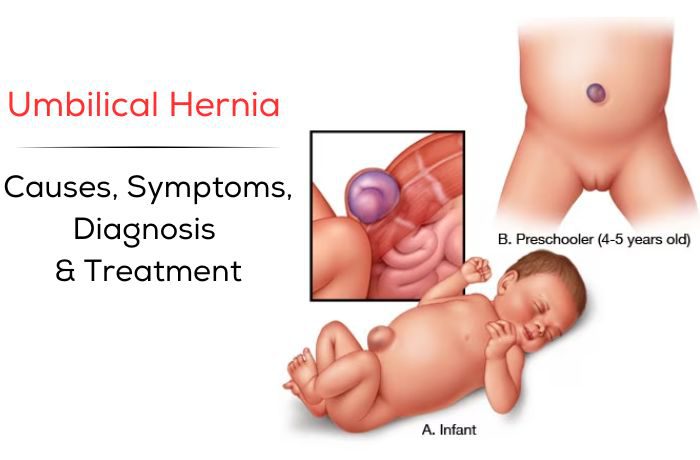
Umbilical Hernia: Causes, Symptoms, Diagnosis & Treatment
Umbilical hernias are a common condition experienced by many people, especially infants. Characterized by a bulge or swelling near the navel, an umbilical hernia occurs when part of the intestine protrudes through the abdominal muscles. This condition can affect both infants and adults, although it is more common in newborns. This blog will explore the causes, symptoms, diagnosis, and treatment of umbilical hernias to help you better understand this condition. We will also highlight the expertise of Dr. Apoorva Kulkarni, a renowned pediatric surgeon in Thane, who provides specialized care for children with umbilical hernias.
What is an umbilical hernia?
An umbilical hernia occurs when there is an opening in the abdominal wall muscles. In infants, this happens when the opening through which the umbilical cord passes does not close completely after birth. In adults, it can occur due to increased abdominal pressure from factors such as obesity, multiple pregnancies, or heavy lifting. Unlike other types of hernias, umbilical hernias don’t usually cause serious problems, but understanding them is crucial to effectively managing their effects.
Causes of Umbilical Hernia
Umbilical hernias can be caused by several factors, including
1. Genetic factors: A family history of hernias may increase your risk.
2. Lifestyle and environmental factors: Heavy lifting, chronic coughing, or straining during bowel movements can contribute.
3. Medical conditions: Obesity, pregnancy, and certain medical conditions that increase abdominal pressure.
Symptoms of Umbilical Hernia
Symptoms of an umbilical hernia include
1. A visible bulge near the navel may be more noticeable when you cry, cough, or strain.
2. Pain or discomfort in the area of the bulge.
In severe cases, vomiting and tenderness around the hernia.
It’s important to see a doctor if you experience any of these symptoms, as early diagnosis can prevent complications.
Diagnosis of Umbilical Hernia
Diagnosing an umbilical hernia typically involves
1. Physical examination: A doctor will examine the bulge and ask about your symptoms.
2. Diagnostic tests: Ultrasound or CT scans may be used to get a detailed view of the hernia.
Early diagnosis is important for effective treatment and to avoid potential complications.
Treatment options for umbilical hernia
Treatment options for umbilical hernia vary depending on the severity of the condition:
-Non-surgical treatments: In some cases, especially in infants, the hernia may close on its own. Lifestyle changes, such as weight management and avoiding heavy lifting, may also help.
-Surgical treatments: If the hernia is large or causing pain, surgery may be needed. The most common procedures are herniorrhaphy (open surgery) and laparoscopic surgery.
Recovery from surgery usually involves rest and avoiding strenuous activity for a few weeks.
Prevention of Umbilical Hernia
You can prevent an umbilical hernia by
1. Maintaining a healthy weight.
2. Avoid heavy lifting and use proper lifting techniques.
3. Treating and managing chronic cough or constipation to reduce abdominal pressure.
4. Taking these preventative measures can help reduce your risk of developing an umbilical hernia.
Complications of untreated umbilical hernia
If left untreated, an umbilical hernia can lead to serious complications, including
Strangulation: The blood supply to the protruding intestine can be cut off, leading to tissue death.
Infection: An untreated hernia can become infected, causing severe pain and other health problems.
Early treatment is essential to prevent these complications and ensure overall health.
Umbilical Hernia in Children
Umbilical hernias are common in infants and are usually harmless. They often close on their own by 1 or 2 years of age. However, if the hernia is large or persists beyond this age, medical intervention may be necessary.
Parents should monitor the hernia for signs of pain, swelling, or color change and consult a doctor if they are concerned.
Consulting with a Specialist
Specialist care can significantly improve outcomes for those with umbilical hernias. Dr. Apoorva Kulkarni, a leading Pediatric Surgeon in Thane, offers expert consultation and treatment services. Her dedication to child health ensures personalized care for young patients with umbilical hernias, addressing both preventive strategies and effective treatments.
Understanding the causes, symptoms, diagnosis, and treatment options for umbilical hernias can help you manage the condition effectively. If you experience any symptoms or have any concerns about umbilical hernias, seek medical advice immediately. For expert care and consultation, you can contact Dr. Apoorva Kulkarni, a trusted pediatric surgeon in Thane, for personalized treatment and support.
